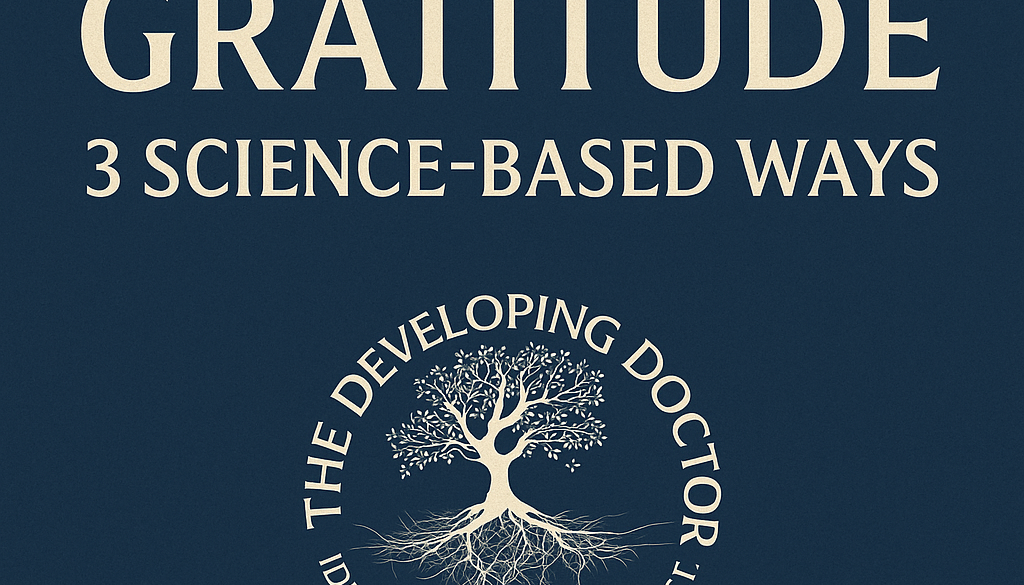Gratitude in Practice: Three Science-Backed Ways to Rewire Your Mind and Restore Meaning
Moving From Understanding to Action
Last week, we explored how gratitude isn’t just an emotion, it’s neuroscience. When we truly experience gratitude, the medial prefrontal cortex lights up, serotonin and oxytocin increase, and inflammatory markers decrease. Gratitude literally rewires the brain, shifting us from survival mode into connection and meaning.
But understanding the science is just the first step. The real transformation happens when we consistently and intentionally practice gratitude.
Medical careers are demanding. Practicing gratitude isn’t about minimizing the challenge. It’s about redirecting your attention to include what’s working, what’s meaningful, and what still brings you joy.
The Neuroscience of a Grateful Mind
Before diving into the “how,” let’s revisit why expressing gratitude works.
When you experience genuine gratitude, your brain engages both the ventromedial prefrontal cortex and the anterior cingulate cortex. These regions are tied to emotional regulation, empathy, and decision-making. They form a feedback loop with the limbic system to dampening stress responses and amplify feelings of safety and connection.
Research from institutions like UCLA and UC Berkeley has shown that regular gratitude practice strengthens these neural pathways, creating long-term improvements in mental health, resilience, and even immune function. Gratitude doesn’t just change how you feel. It changes what your brain pays attention to.
Three Evidence-Based Gratitude Practices
1. Story-Based Gratitude
Rather than listing things you’re grateful for, recall a specific story of gratitude. Think of a patient who thanked you sincerely, a colleague who supported you, or a loved one who showed kindness.
Close your eyes and re-live that moment in detail—the words, the sensations, the emotion. Studies show that re-experiencing gratitude through narrative activates the same brain networks as the original event, magnifying its neurochemical benefits.
2. Gratitude Letter
Write a short letter to someone you’ve never fully thanked. It could be a mentor, nurse, teacher, or friend. You don’t even have to send it to benefit from the exercise, though if you do, the impact doubles.
Research from Dr. Martin Seligman’s Positive Psychology Lab shows that the act of writing the letter, reliving the memory, and organizing your appreciation into words boosts happiness and reduces depressive symptoms for weeks afterward.
3. Gratitude Reappraisal
This one’s especially relevant for physicians. When you encounter a difficult case or frustrating interaction, reflect on it at the end of the day and ask:
“What did I learn?” or “What strength did I use to navigate this challenge?”
Gratitude doesn’t erase pain, it reframes it. By recognizing growth from hardship, you engage higher-order cognitive processes that shift perspective from threat to purpose.
How Coaching Amplifies Gratitude in Practice
Like any skill, gratitude deepens with reflection and guidance. A coach helps you notice blind spots, challenge negative thought loops, and align gratitude practice with your personal values.
In my work with physicians, I often see gratitude act as a catalyst. It’s not the end goal. Rather, it is the spark that reconnects people to why they entered medicine in the first place. Coaching creates the structure and accountability to sustain that spark.
Over time, gratitude and self-awareness form a feedback loop: the more grateful you become, the more clearly you see opportunities for growth, meaning, and joy.
A Practice, Not a Performance
Gratitude isn’t about pretending everything’s fine. The healthcare system is still a dumpster fire. Your Epic inbox might still be overflowing. Someone still needs to cook dinner tonight. Gratitude is, however, about remembering that even in chaos, good still exists. When paired with coaching, gratitude becomes more than a daily exercise; it becomes a mindset that transforms how you experience your work, your relationships, and yourself.
Next week, we’ll close this gratitude series by exploring how to make gratitude a lasting habit that strengthens resilience, connection, and joy in everyday life.





